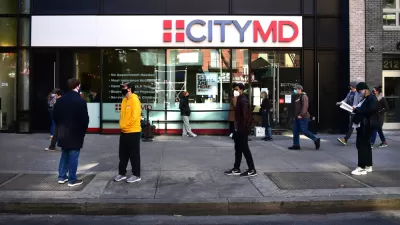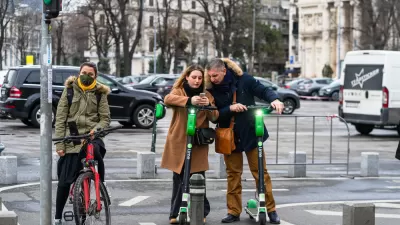Rapid urbanization and dense cities with inadequate infrastructure are being cited as leading causes in the spread of dengue fever throughout Southeast Asia and the rest of the world.
Nearly half of the world's population is at risk according to health experts. The dense urbanized areas of Southeast Asia are breeding grounds for the disease, which can then easily spread.
"'As early the 1980s, dengue fever had reached epidemic proportions in some countries in Asia long before climate change became an issue. Rapid urbanization, increase in air travel and lack of mosquito control are the main drivers of the disease.'
Duane Gubler, director of Asia Pacific Institute of Tropical Medicine and Infectious Diseases at the University of Hawaii, said dengue spreads quickly in crowded cities with inadequate basic services, such as potable water, sanitation and waste-management and weak public health infrastructures."
FULL STORY: Urban sprawl, bad sanitation spread dengue fever

Planetizen Federal Action Tracker
A weekly monitor of how Trump’s orders and actions are impacting planners and planning in America.

Chicago’s Ghost Rails
Just beneath the surface of the modern city lie the remnants of its expansive early 20th-century streetcar system.

San Antonio and Austin are Fusing Into one Massive Megaregion
The region spanning the two central Texas cities is growing fast, posing challenges for local infrastructure and water supplies.

Since Zion's Shuttles Went Electric “The Smog is Gone”
Visitors to Zion National Park can enjoy the canyon via the nation’s first fully electric park shuttle system.

Trump Distributing DOT Safety Funds at 1/10 Rate of Biden
Funds for Safe Streets and other transportation safety and equity programs are being held up by administrative reviews and conflicts with the Trump administration’s priorities.

German Cities Subsidize Taxis for Women Amid Wave of Violence
Free or low-cost taxi rides can help women navigate cities more safely, but critics say the programs don't address the root causes of violence against women.
Urban Design for Planners 1: Software Tools
This six-course series explores essential urban design concepts using open source software and equips planners with the tools they need to participate fully in the urban design process.
Planning for Universal Design
Learn the tools for implementing Universal Design in planning regulations.
planning NEXT
Appalachian Highlands Housing Partners
Mpact (founded as Rail~Volution)
City of Camden Redevelopment Agency
City of Astoria
City of Portland
City of Laramie





























